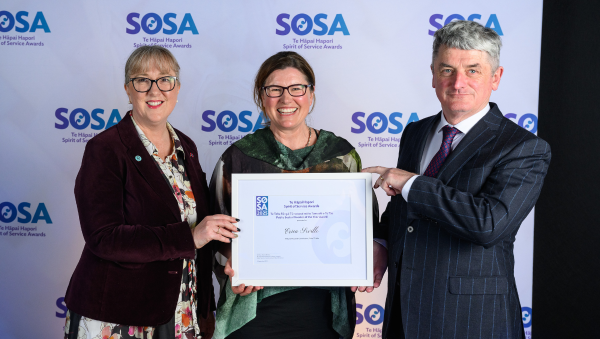Boardroom Premium


The Public Sector Director of the Year 2025 shares how she approaches trust, leadership and learning in the boardroom.
Baptism by fire is how Wānaka-based Erica Seville CMInstD describes her first ‘proper’ board role in 2018, when she joined EQC – now the Natural Hazards Commission (NHC).
“I suddenly realised that in a formal governance position, there are different levers you need to pull to get things done and learning to influence within that. It was so different to everything I had done before,” says Seville, an experienced leader.
Now, six years on, Seville chairs NHC’s People, Culture and Governance Subcommittee and was named Public Sector Director of the Year 2025 – an award that came as a surprise.

“I didn’t expect to win, so I was blown away – but it was also recognition of the good governance happening at NHC, which has gone from strength to strength. That’s what I was most stoked with. It shows maturity, that the organisation has grown in confidence and is building trust.”
Like many directors, Seville sees governance as a process of continuous learning. One key insight she has gained over the years is the value of asking open-ended, agenda-free questions.
“It drives genuine curiosity and fosters better dialogue. It also encourages management to think differently and brings out the best in people.”
Seville says staying true to the organisation’s purpose and its strategic goals also ensures it survives tough times. Remaining grounded and in-the-moment also averts any tendency for the board to “fight fires to get through an immediate crisis”.
“It’s remembering you’re there for something important, particularly when working with public sector organisations that will be around a lot longer than you will be as a board member,” she says.
It also means wins might feel small or incremental. “Winning in a board context is making sure you’ve really canvassed an issue from all perspectives and collectively landed in a good place for the organisation. That frames all good decisions,” she says.
Dealing with change is a constant for boards, but when someone steps down, it leaves a gap in the thinking around the table and Seville is always cognisant of ensuring the other strands of perspectives aren’t lost.
Much like a spider spinning additional strands into its web, for Seville, the different ways of seeing are accumulated over time and become second nature.
“You learn to see the world a little bit through their eyes, so you can bring that perspective to the table as well,” she says.
As a chair, the key is helping boards to stay focused, ensuring what matters most is prioritised.
“There’s an art to chairing a board,” says Seville, who is candid about the challenges of navigating tension, especially when the stakes are high.
That’s why she invests early in building trust and strong communication. It sets the board up for when braver, more challenging conversations are needed.
When asked how directors should navigate a situation where the chair is no longer effective and it’s time for a refresh, Seville’s advice is to focus on what’s best for the organisation. She encourages collective reflection and self-reflection.
“Things are never 100% perfect, but that process prompts vulnerability, self-awareness and sometimes even course correction – and to ask whether you have added value,” she says.
This includes considering the impact your contribution had on management and the feeling they were left with after the meeting. As a practice, Seville believes this can transform the culture and effectiveness of the board.
Coming back to the continuous nature of learning as a director, Seville likens it to raising children. “Just when you think you’ve got it sussed, the child goes into a new phase and you realise you have to change and adapt.
“Your governance style needs to change to meet the organisation and the board where it’s at, so you can be the best governor in that moment,” she says.
Governance isn’t about being perfect, but growing and changing through the process, according to Seville. What drives her is making sure the organisation is the best it can be, and “working with great people because life’s too short to work with people who are difficult”.
“After a meeting, you’ll never go, ‘I completely nailed that’, so it’s just a matter of remaining curious and always learning and recognising that governance is such an art,” she says.
Post-award, Seville is optimistic – the path in front of her is an open book. As for the future of governance and those new voices coming through, she hopes to see boards reflect true diversity beyond the usual pools.
“Let’s not get too stale in our thinking about who makes good governance material. Each of us has multiple dimensions, but governance is a team effort and we need to invest in and grow the next generation of governors,” she says.